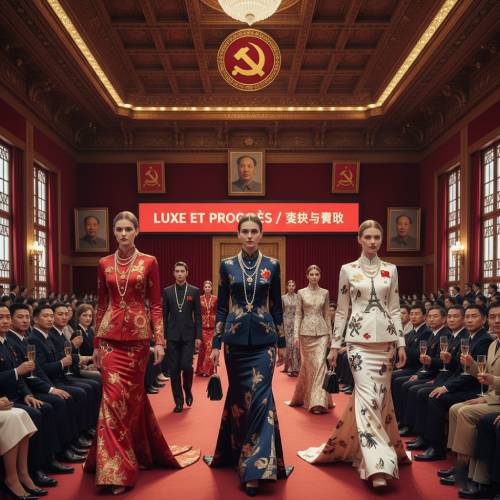 When the Chinese Communist Party Champions… Consumption. It’s an announcement that would make Karl Marx smile if he ever saw the price of a J’aDior handbag. On Tuesday, the Chinese government unveiled the broad outlines of its 15th Five-Year Plan, with one clear ambition: to boost household consumption. Yes, you read that correctly the Chinese Communist Party wants its citizens to shop more.
When the Chinese Communist Party Champions… Consumption. It’s an announcement that would make Karl Marx smile if he ever saw the price of a J’aDior handbag. On Tuesday, the Chinese government unveiled the broad outlines of its 15th Five-Year Plan, with one clear ambition: to boost household consumption. Yes, you read that correctly the Chinese Communist Party wants its citizens to shop more.
Presented at the close of the fourth plenum of the 20th Party Congress, this strategic plan aims to rebalance the country’s economy, still too reliant on exports and public investment, by giving more weight to domestic demand. A logic that smells distinctly of Keynesianism… with a mandarin twist.
This 15th plan does not mark an ideological revolution it continues a trend that began several years ago. But what’s new is the scale of the rhetoric around “common prosperity” and the rise of a consumer middle class, expected to become the engine of China’s future growth.
The authorities want to support purchasing power, improve social protection, and stimulate demand for high value-added goods and services. And among those goods, of course… is luxury.
The irony is hard to miss: the land of Mao has become Louis Vuitton’s dream market. In the streets of Shanghai and Chengdu, the LV monogram is more recognizable than the five-starred red flag. Paris Watches with a Knowing Smile. French luxury houses are observing this shift with a discreet but eager smile. LVMH, Kering, Hermès, and Chanel all know that China already accounts for nearly one-third of the global luxury market. If domestic consumption continues to rise, a new golden age may well be dawning for Parisian storefronts.
“When the Communist Party supports consumption, the entire Faubourg Saint-Honoré applauds,” quips an analyst in Hong Kong.
The brands are adapting quickly: investing locally, forming partnerships, and multiplying collaborations. Raysun Shi recently brokered a deal between Kim Jones and the Chinese outerwear specialist Bosideng, while Cui Dan helped Kris Van Assche design a collection for sportswear giant Anta. These strategic alliances illustrate the growing fusion between French craftsmanship and Chinese ambition.
Luxury, but Make It Virtuous. Still, in Beijing, consumption must remain “virtuous.” The government has no intention of turning the People’s Republic into an endless fashion show. Authorities closely monitor any excess of ostentation, promoting instead a more discreet, cultural, and almost philosophical kind of luxury.
French houses will need to tread carefully to seduce without provoking, inspire without dominating, and shine without blinding.
A Marxist Paradox, with a Designer Label. The paradox is striking: a communist country turned the engine of global capitalism, where handbags rival revolutionary slogans. Yet perhaps it’s not so surprising. China hasn’t abandoned its principles—it still believes in planning; it’s just planning prosperity now.
And if, a few years from now, a Five-Year Plan decided to subsidize haute couture, no one would be shocked. After all, didn’t Marxist dialectics predict that history advances through contradictions?
FM
